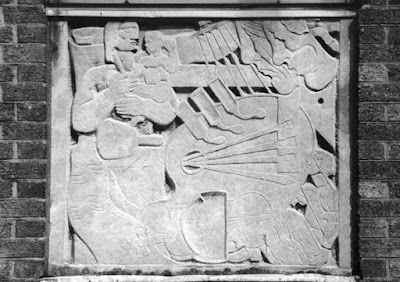 |
| An exhibition at the Art House |
My brief description of the interior of Rotherham Minster marked the 700th post in my Language of Stone Blog, which started out back in 2014 as an illustrated Curriculum Vitae and has since continued as a report – in chronological order – on my investigations of the geology and historic stone built architecture of South Yorkshire and the surrounding counties.
Occasionally a noteworthy project has been overlooked, as with an exhibition at the Art House in Sheffield, which came about after I had taken a selection of hand printed black and white photographs into a ceramics class that I had been attending for a few months. I wanted to get a few ideas for my next project – a grotesque based on examples that I had recently seen at various mediaeval churches and in the centre of Sheffield.
Having taken up black and white photography in 1992, after reluctantly leaving the building restoration industry in London, my subject matter consisted predominantly of various stone carvings in churchyards and cemeteries, as well as those on various historic stone buildings that I encountered as a member of English Heritage and the National Trust.
After leaving a photo album open at national trade exhibition, the RCHME (now the Historic England archives) were particularly interested in my eye for detail and commissioned me to take as many examples of post-war architectural sculpture as I could find - at £10 per print.
Once I had begun to develop and refine my black and white printing skills, in a home darkroom and at Sheffield College and the Site Gallery, my productivity increased at a substantial rate until I began to write for stone trade and related professional magazines, where colour transparencies were the preferred format for submitted photographs.
By the time that I had the opportunity to get up close to the frieze sculpture by Richard Westmacott Junior at the Royal Exchange - when working as the site manager during its restoration in 2002 – digital photography had become well established. Although I also used several rolls of transparency and black and film to record work in progress, which were processed with contact prints, I haven’t been in a darkroom since.
When my ceramics tutor at the Art House, Krishna Alageswaran, suggested that I show my work at one of the regular exhibitions at this excellent art space, which operates as a social enterprise, I jumped at the chance - especially since the curator, Amanda Evans, had volunteered to undertake the bulk of the preparatory work.
Sitting on the sidelines, while Amanda seemed to spend hours sorting through and continually rearranging the contents of two boxes of 7” x 5” and 12” x 8” prints, which hadn’t seen the light of day for very many years, I just supplied the coffee and contributed to the process when asked.
The exhibition was originally planned to run for 3 weeks, which was subsequently extended, and this provided plenty of time for students of the various pottery and painting classes - as well as visitors to the cafe and exhibition space – to take a good look at my work.
The temporary exhibition space on the stairs to the first floor studio and the adjoining corridor and waiting area is well lit and, after Amanda had finally finished her arrangement, I was pleasantly surprised by the number of photographs on display.
An afternoon ‘meet the artist’ session was also arranged, when visitors came not just from Sheffield but other parts of South Yorkshire and further afield too, and the various people who commented on the exhibition were very positive.











No comments:
Post a Comment